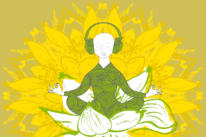
“Freedom is instantaneous the moment we accept things as they are.” ~Karen Maezen Miller
My personal rock-bottom wake-up call came a few years ago when, despite having achieved all of my personal and business goals, I found that I still wasn’t content or experiencing peace of mind.
Feeling frustrated, I realized that I could no longer rely on my future to fulfill me. I knew continuing to work so hard to accomplish bigger and better goals wasn’t going to relieve my eternal itch that there must be more to life than this.
To make matters worse, my increasing frustration led to a rocky time in my relationship, which inevitably ended with my partner leaving. Along with the beautiful child I’d been raising, the great house I was living in, the fancy car I was driving, and the pile of money we’d jointly secured as projects fell away too.
Rock bottom, needing peace, I started exploring alternative ways of thinking, being, and living.
It was around about that time when I met a group of meditation teachers that changed my life. I saw in their eyes a peace and joy that I had rarely seen before. And the more I spent time with them, the more it became obvious to me that their inner peace was consistent.
Hungry to experience the same, I packed my bag and headed off to meditate with them for a few months. I spent ten weeks on the island of Patmos in Greece, followed by a further fourteen weeks in the mountains of Mexico.
During my time meditating I had a total turnaround in thinking. I discovered the real cause of my persistent problems had never been my failings at “thinking positively.”
Instead, my habit of thinking was the ultimate cause of my problems. When I was busy thinking, I was missing the peace that’s always present. And by learning to think less and be present, I found life much more enjoyable.
Meditation serves many purposes, from stress relief to self-awakening. Personally, I started meditating because I was fed up with my mind working overtime. I wanted peace, and through meditating regularly I have become less focused on the movement of my mind and more aware of the pristine peace that is always present.
Despite meditation being so simple, and having such big rewards, there are some myths about meditation that can stop people getting started or make them quit before they get to reap the benefits possible from meditating regularly.
The top meditation myths are:
Myth #1: Meditation is difficult.
Practiced correctly, meditation can be the easiest and most enjoyable thing you ever do. For something to be difficult, it requires effort, struggle, stress, and stamina.
However, the truth is meditation requires the exact opposite. There is no effort because you are learning how to do nothing. There is no struggle because you are not forcing anything. There is no stress because you are not resisting anything, and there is no need for stamina because the main purpose of meditation is to relax!
Myth #2: I must still my mind.
“I can’t meditate because I can’t stop my thoughts” is one of the most common reasons I hear from people who’ve tried meditation but quit. However, what’s important to understand is that thoughts are a natural (and necessary) part of meditation.
When you meditate, your body gets rest. When the body rests, it heals. Healing is an active process—stress is released and healing is being undertaken. Due to the mind-body connection, activity in your body is reflected by activity in your mind, in the form of thoughts.
Thoughts are therefore a sign that healing is taking place in your body. Healing your nervous system is a fantastic by-product of meditation. It is not useful to resist having thoughts when meditating. To resist thoughts is to resist healing!
Instead, let the healing process happen, as it naturally wants to, by not resisting the existence of thoughts.
Let them come and go by learning to be at peace with whatever thoughts want to happen when you are meditating.
Myth #3: If thoughts are okay, then it’s good to think.
Although having thoughts is okay, I am not recommending you intentionally think your way through every meditation. There is a big difference between having thoughts and thinking.
When you are meditating, you want to let thoughts flow through your awareness without engaging in them through the act of thinking.
Thinking occurs when you stop observing your thoughts and you start being your thoughts.
When you are thinking, you are in the thought stream. You are in the dream. Engaged in the story of your mind, you are having an imaginary conversation with your friend, planning what you’re going to have for dinner, or whatever.
Thinking is very similar to falling asleep. When you are thinking, you are essentially lost in your mind. You are no longer present, nor consciously aware of your real self. Thinking is a habit you learn to do less through the regular practice of meditation.
Be gentle on yourself if you find yourself thinking when meditating. It’s just a habit! When you become aware that you’ve been thinking, simply come back to being alert and present.
Myth #4: Meditation stops when I open my eyes.
Most of your day will be spent with your eyes open, so thankfully the little flaps of skin that you call your eyelids do not need to impact your peace.
Peace is experienced when you put your attention on the still, silent space that resides within your conscious awareness. You can direct your attention with your eyes open and closed.
One “goal” of meditation is to develop the habit of effortlessly having some of your attention looking inward on the presence of still silent space at all times. Eyes open or closed—it need not matter.
Myth #5: It takes a long time to enjoy any benefits.
You start benefiting from meditation from the moment you begin. You might not experience immediate peace or joy, but your body will get a chance to rest, release stored stress, and heal.
This myth reminds me of a story. A seventy-year-old man wanted to learn to play piano. His son questioned what the point was because it takes so long to learn. However, the piano-playing pensioner wasn’t persuaded to quit. Instead, he simply told his son that if he started now he’d be a much better piano player by age seventy-five than if he didn’t start at all.
I love this story because it is very much the same for meditation. It may take a little time to experience highly noticeable changes. But if you start, and keep doing it regularly, you can be sure you will be experiencing much more peace, love, and happiness over the coming months and years, compared to if you never start at all.
About Sandy Newbigging
Sandy Newbigging is the creator of the Mind Detox Method, a meditation teacher, and author of several books including New Beginnings, Life Detox, and Heal the Hidden Cause. His work has been featured on television channels including Discovery Health. Visit him at sandynewbigging.com or on Facebook or Twitter.













 Though I run this site, it is not mine. It's ours. It's not about me. It's about us. Your stories and your wisdom are just as meaningful as mine.
Though I run this site, it is not mine. It's ours. It's not about me. It's about us. Your stories and your wisdom are just as meaningful as mine.